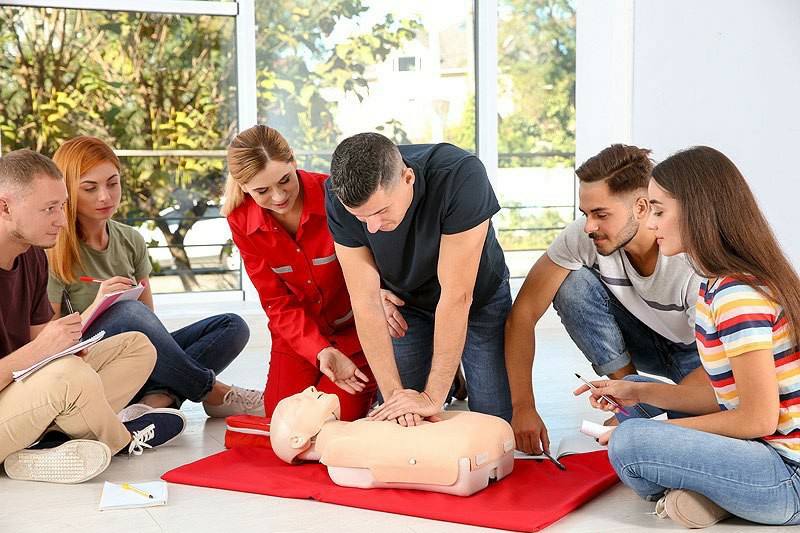Empower Your Workplace: The Essential Benefits of First Aid & CPR Training
In today’s fast-paced world, emergencies can strike at any moment, and being prepared can mean the difference between life and death. Comprehensive First Aid and CPR training is no longer a luxury—it is an essential investment for every workplace. This blog post will explore the critical importance of First Aid Certification and the key benefits of enrolling in a robust First Aid Course.
The Importance of First Aid and CPR Training for Safety and Emergency Preparedness
Every workplace, regardless of size or industry, faces the potential for emergencies. From minor injuries to life-threatening situations, having staff trained in First Aid and CPR is crucial. Here are several reasons why:
- Immediate Response: In an emergency situation, every second counts. Trained individuals can provide timely assistance, which can significantly reduce the severity of injuries or health issues.
- Enhanced Confidence: Completing a First Aid Course empowers employees with the knowledge and skills to act effectively during crises, leading to a more confident and prepared workforce.
- Legal Compliance: Many industries have strict compliance requirements regarding workplace health and safety. Achieving First Aid Certification helps organizations meet these regulations, reducing legal liabilities.
Critical First Aid Skills Every Workplace Should Implement
Having a solid grasp of basic emergency response skills is essential for any workplace. Below are some key areas of focus:
- Basic Emergency Response: Understanding how to assess situations and determine the appropriate course of action.
- Wound Care: Learning how to treat cuts, scrapes, and other injuries to prevent infection and promote healing.
- Choking Relief: Knowing the necessary steps to assist an individual who is choking can be lifesaving.
- First Aid for Burns: Understanding how to treat various degrees of burns accurately and promptly.
- Shock Management: Recognizing the signs of shock and knowing how to respond is critical in many emergencies.
Understanding CPR: Essential Techniques for Workplace Emergencies
CPR (Cardiopulmonary Resuscitation) is a vital skill that can save lives during cardiac emergencies. Employees trained in CPR should be familiar with:
- Chest Compressions: The importance of high-quality compressions and the correct hand placement.
- Rescue Breaths: When and how to administer rescue breaths effectively.
- Using an AED: Training in the use of Automated External Defibrillators (AEDs) is crucial, as they are becoming more common in workplaces.
How First Aid Certification Ensures Workplace Health & Safety Compliance
Compliance with health and safety regulations is non-negotiable for business owners and HR professionals. Here’s how First Aid certification contributes:
- Adherence to Regulations: Most industries require specific training certifications; ensuring staff is certified keeps your organization compliant.
- Reduction in Liability: By training employees in First Aid and CPR, your organization shows its commitment to safety, which can reduce potential liability claims.
- Improved Safety Culture: Promoting a culture of safety and preparedness can lead to lower injury rates and increased employee morale.
Emergency First Aid Procedures: Step-by-Step Guide for Immediate Action
When an emergency occurs, having a strategy in place is vital. Here are critical steps to take:
- Assess the Scene: Ensure the area is safe for both the rescuer and the victim.
- Call for Help: Always call emergency services when necessary.
- Provide First Aid: Administer relevant first aid based on the situation until professional help arrives.
Choosing the Best First Aid Training Course for Your Employees
When selecting a First Aid Course, consider the following:
- Accreditation: Ensure the course is certified and recognized by relevant authorities.
- Course Content: Review the curriculum to guarantee it meets your workplace’s specific needs.
- Instructor Experience: Choose courses taught by qualified, experienced instructors.
Advantages of Online First Aid and CPR Training for Busy Teams
For busy organizations, online training options provide flexibility without compromising quality. Benefits include:
- Flexible Learning: Employees can complete courses at their own pace and convenience.
- Cost-Effective: Online courses can often be more affordable than in-person sessions.
- Access to Resources: Many online programs offer extensive resources and materials for continuous learning.
Conclusion & Call to Action
Investing in First Aid and CPR training is not just about compliance—it's about creating a safer, more prepared workplace. By obtaining First Aid Certification, you empower your team to act decisively in emergencies, fostering a culture of safety. Don’t wait until it’s too late. For more information or to enroll in a comprehensive First Aid Course, contact us at [email protected] today!



 349,500 Offered Certificates
349,500 Offered Certificates
 24/7 Online Training
24/7 Online Training
 Money Back Guarantee
Money Back Guarantee
 Fully Accredited Courses
Fully Accredited Courses
